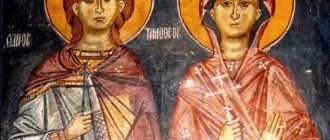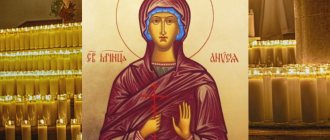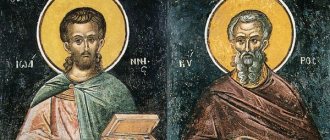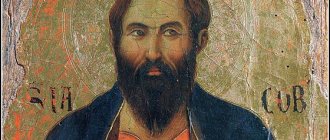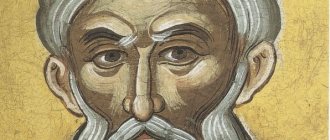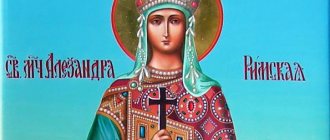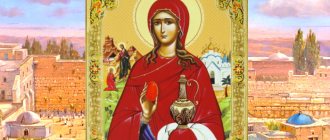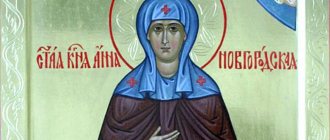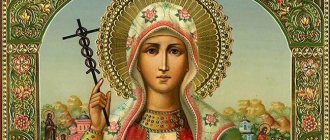The name Ruslan in Orthodoxy is not present at baptism; it is not in the calendar. This name has not been canonized by the church and therefore its owners do not celebrate name days. The name Ruslan at baptism changes to another one that is closest in sound. Or the name of the saint whose memory is closest to the date of birth is chosen.
The holy martyr Rusticus of Paris was killed in Gallic Lutetia in 96
The holy martyr Rusticus was killed in Gallic Lutetia in the year 96 along with the holy martyrs Dionysius the Areopagite, Bishop of Athens and Deacon Eleutherius. They were killed during persecution under the emperor Domitian.
Saint Dionysius lived in the city of Athens, where he was raised and educated. Together with his friend, he witnesses a solar eclipse at the very moment when the crucifixion of Jesus Christ took place.
Saint Dionysius lived in the city of Athens, where he was raised and educated. He then decided to go to Egypt, where he began to study astronomy. Together with his friend, he witnesses a solar eclipse at the very moment when the crucifixion of Our Lord Jesus Christ took place.
Then Dionysius said that this eclipse means either the Creator of the whole world, or that the visible world is ending. When he returned to Athens, he was elected a member of the Areopagus.
Saint Emilia: life and icon of the mother of Basil the Great, veneration in Orthodoxy and prayers
At the dawn of Christianity, in the 4th century, in the lands that belonged to the Roman Empire, there lived a woman who gave birth to ten children, five of whom were canonized by the church after their death. Her name was Emilia of Caesarea. The saint was presumably born in 305 in the city of Neocaesarea.
The girl's parents owned a lot of land in Asia Minor. The father and mother of the righteous woman were adherents of Christian teaching, for which they paid with their lives. Left an orphan, the girl wanted to become a nun.
However, the Lord had other plans for her. Many men of Neocaesarea were struck by Emilia's beauty. Some even planned to kidnap the girl from her home and forcefully marry her.
The orphan had to agree to marry a rhetoric teacher, lawyer Vasily.
The girl's groom was the son and grandson of pious Christians who steadfastly defended their faith in Christ even during persecution. Emilia got married when Constantine the Great began to rule the Roman Empire.
Under the new emperor, the persecution of Christians stopped. Emilia was a faithful wife to her husband and a like-minded person who shared his religious views.
The woman gave birth to children, raised them in the spirit of Christianity, and from childhood taught each of her children to keep the commandments of God.
Christians remember Emilia, first of all, as the mother of Basil the Great, the pious shepherd of Caesarea in Cappadocia, who fought for the purity of the faith with the Arians.
The Church canonized this son of the most holy woman, as well as her two other children - Gregory, Bishop of Nyssa, and Peter, Bishop of Sebaste.
Emilia’s two daughters, the Venerable Macrina and the righteous Theozva, were also canonized. The rest of her children started families and lived to glorify the Lord.
Emilia and Vasily led a strange life for those times. They owned huge tracts of land in Cappadocia, Pontus and Lesser Armenia.
However, they never visited theaters or horse races; on the contrary, they despised the idle life of their rich contemporaries. All members of the pious family prayed to the Savior and lived according to his teachings.
Following the commandments of God, the couple engaged in charity work, gave shelter to the poor, and fed the hungry.
After the death of her husband, the righteous woman with her daughter Macrina and faithful servants moved to her family estate in Pontus, located near the Iris River. In this place, women founded a nunnery.
Emilia and her daughter lived like nuns, prayed to God, wore modest clothes, and ate with the rest of the inhabitants of the monastery. Having lived 73 years, Emilia died.
The righteous woman was buried in 375 in the family crypt near the church built in honor of 40 martyrs.
Congratulations
In Athens, Dionysius met the Apostle Paul, who carried the word of God throughout the world
At this time, the Apostle Paul began preaching in Athens. Dionysius, seeing his strong faith, also accepted his saving gospel and became a Christian. In the coming years, Dionysius was a companion of the Apostle Paul. Just like him, he preached the word of God.
The Apostle Paul began preaching in Athens. Dionysius, seeing his strong faith, also accepted his saving gospel and became a Christian
A little later, the Apostle Peter became a bishop. In 57, Dionysius was present at the burial of the Most Holy Theotokos.
Even during his lifetime, when Dionysius saw the Mother of God for the first time, he wrote to the Apostle Paul that there is nothing in the entire universe so filled with Divine power and grace.
No one could comprehend with his mind what he saw with his own eyes.
When he was brought before the face of the Blessed Virgin, he experienced inexpressible feelings that he had never experienced before.
Some kind of Divine radiance shone in front of him. “...It illuminated my spirit,” said Dionysius. He also described to the Apostle Paul how he felt the fragrance of some indescribable aromas and was filled with such delight that neither his body nor his spirit simply could bear these signs.
He had such grace that his heart fainted and his spirit fainted. He also said that if not for the instructions of the Apostle, he would have immediately thought that it was God, because he simply could not imagine greater bliss than what he felt in those minutes.
When the Apostle Paul died, Dionysius intended to continue his work
When the Apostle Paul died, Dionysius was fully determined to continue his great works. He went to preach further, to Western countries, together with Presbyter Rustik and Deacon Eleutherius. It is here that we first learn about such a person in Orthodoxy as Rusticus of Paris.
Rustic is a name of Roman or Latin origin. Rustic is a rather ancient name that arose long before the advent of Christianity
The first question that arises when we hear this name is what is its origin? Rustic is a name of Roman or Latin origin. why can this be assumed? A full Roman male name consists of three components: the first component is the personal name, the second component is the generic name, and the third component is the name of the branch of the genus.
An example is a man named Gaius Julius Caesar Caligula. Here Guy is a personal name, Julius is the family name of the Julievs, Caesar is from the family of Caesars, and Caligula is already a personal nickname. Therefore, it can be assumed that the name Rustic is of Latin origin, since the father’s personal name was usually passed on to the eldest son, and in order to somehow distinguish the son from the father, a third name was sometimes used.
Rustic is a rather ancient name that arose long before the advent of Christianity.
In one Roman inscription, the grandfather, son and grandson were referred to as Quintus Fulvius Rusticus - grandfather, Quintus Fulvius Attianus - son, and Quintus Fulvius Carisianus - grandson. Rustic is a rather ancient name that arose long before the advent of Christianity.
In one Roman history there was a mention of Rusticus Julian, the head of the office of the rescripts. But definitely not, not the date of this inscription, and when exactly this name appeared.
What name to choose for Ruslana at baptism
At baptism, you cannot give a child the name Ruslan, since in Orthodoxy there are no saints who bear this name. Therefore, during the sacrament of baptism, if there is no name in the calendar, a consonant one is chosen. In the case of Ruslan, these could be the names Roman, Rustik or Rostislav. In the future, you must use the chosen name as your church name.
Among the saints whose name is close and similar to the name Ruslan is the Great Martyr Rustik (the emphasis is on the last syllable). In most cases, and at the request of parents, the clergy suggest choosing this particular name at baptism. But the main thing is to know that when saying prayers for Ruslan, you need to say the name under which he was baptized.
In Galia, Rusticus, Dionysius and Eleutherius were captured and executed for their faith in Christ.
They converted many to Christ in Rome, then in Germany, Spain and many other cities. In Galia there was a time of persecution of Christians, and paganism was widespread. It was in this place that Dionysius and his men were captured. For their preaching they were thrown into prison. But this did not stop the martyrs from continuing to pray to God.
Deacon Eleutherius, along with Dionysius and Saint Rusticus, were thrown into prison and beheaded
At night, Dionysius performed Divine Liturgies in the concelebration of the Angels of God. The next morning, all three martyrs were beheaded. Everyone marveled at such a miracle when Saint Dionysius took his head and walked with it to the temple and only there fell dead. One pious woman found the remains and buried them.
It should also be said that the works of St. Dionysius were of great importance to all churches. Only four of his books have survived to this day. One of them sets out the Christian teaching about the world of angels. The purpose of this book is the ascent to Godlikeness through purification, enlightenment and improvement.
Dionysius the Areopagite. About divine names. About mystical theology Buy on OZON.ru
Another of his books, “On Mystical Theology,” sets out the doctrine of the knowledge of God. To know the Lord God, you need to get closer to him, achieve a state of communion with God and deification. All this can be achieved only through prayer, Dionysius wrote in his book. It is pure prayer, coming from the heart, that will help bring God as close as possible.
All the books were kept for almost four centuries in secret tradition by theologians of the Alexandrian Church. They were known only to a few, among them was Saint Gregory the Theologian. Dionysius wrote to Gregory the Theologian interpretations of the Areopagitica.
Origin
The Vyatichi tribes settled in the forests near the upper reaches of the Oka River. The local people, steeped in paganism and sacrifice, led a savage lifestyle. Nestor the Chronicler, describing the Vyatichi, reports on their bodily uncleanliness, indiscriminate eating and polygamy. The idolaters led a primitive life and were distinguished by their aggressive disposition.
The territories inhabited by the Vyatichi were annexed to Kievan Rus by Prince Vladimir in 981. The tribes resisted and rebelled against the prince, who pacified the rebellious people. After 7 years, Vladimir began to select men from the Vyatka tribes for resettlement to the southern cities of Rus'. According to one version, Kuksha was among the chosen husbands.
According to other sources, the saint was the son of the defeated Vyatichi ruler Khodota. The heir was captured by Vladimir Monomakh and converted to Christianity, assigning him to monastic service in the Kiev Pechersk Monastery. The monk was named John, but the pagan name Kuksha was retained by the righteous man.
Akathist to the Holy Martyr Lyudmila, Princess of Bohemia
Life and service to God
Monk Kuksha spent about 15 years of his life within the walls of the Kiev Pechersk Lavra, where he devoted himself to serving the Lord, studying the Gospel and theology, humility and prayer. Here he became a robed monk and received the rank of priest of the Orthodox Church. The eradication of paganism was a priority activity of the monastic monastery, directly connected with the Chernigov See.
By decision of Chernigov Archpastor John, a group of monks led by Kuksha was organized and sent on an apostolic mission to the lands of the pagans. The monk did not resist the responsibility entrusted to him and went to preach the teachings of Christ to his relatives.
Having overcome a long journey along the Desna River, forest thickets and swamps, Kuksha, his student Nikon and his comrades arrived at Mtsensk, not far from which the preacher built a hermitage for reading prayers.
Near the building, he dug a well with his own hands, which was called “Bogomolny”.
Along the path of the mission, Kuksha preached the teachings of Christ in settlements located on the territory of modern Bryansk, Tula, Orel, and Kaluga regions.
The Monk Kuksha read the Gospel to the Vyatichi people and explained the Orthodox canons and commandments in a language they could understand. The saint's sermons were accompanied by miraculous phenomena created by him with God's help.
According to discovered evidence from contemporaries, the Pechersk priest, who reached the highest level of enlightenment, faith, spiritual and moral perfection, performed true miracles:
- healed people who were going crazy;
- cleansed the homes of local residents from demonic influence;
- caused rain to save crops from drought;
- dried up the lake, dispelling pagan beliefs about watermen.
The long-awaited rain caused by the preacher saved the people from hunger and disaster. Kuksha, endowed by the Lord with amazing power, proved to the Vyatichi the inconsistency of their imaginary gods, to whom they made bloody sacrifices. Having drained the lake, the saint showed the people that there were no watermen at its bottom, to whom the Vyatichi sacrificed living people, drowning the unfortunates with stones tied to their necks in the water.
Seeing the miracles of Kuksha, people listened to the monk, marveled at his miraculous deeds and, trusting the saint more and more, gradually converted to the Christian faith and received holy baptism.
The transition from paganism to Orthodoxy was not massive. Baptism proceeded gradually, but with sure steps, dispelling the cloud of ignorance over the lands inhabited by tribes. But some settlements resisted the mission. In particular, discontent came from pagan priests and shamans.
Demise
Hieromartyr Kuksha of Pechersk was brutally killed by a group of local residents who opposed the adoption of Christianity. On an August night, the murderers broke into the monks' refuge and, after cruel torture, barbarously killed the righteous in the dawn hours. Kuksha’s body was found decapitated not far from his well, which also became known as “Suffering”.
Some sources indicate that the saint was killed in the city of Serensk, Kaluga region. The basis for this was the found Orthodox pectoral crosses and other traces of the presence of the apostolic mission, but this may indicate the presence of monks here earlier.
At the hour of the saint’s death, blessed Pimen the Faster saw his terrible fate. In the middle of the Great Pechersk Church, he cried out to the brethren that Kuksha had been killed at dawn, and at that very moment he died.
Meaning and veneration in Orthodoxy
Saint Kuksha is revered by the church as an educator of the Vyatichi people and a hieromartyr, who accepted martyrdom in the name of the Lord God and the formation of the Orthodox faith in the central part of modern Russia. Thanks to the sermons and miracles of the monk, it was possible to bring the word of God into the pagan wilds.
The memory of Saint Kuksha of Pechersk is venerated on the following dates:
Why did the Tatars become Muslims and the Mongols become Buddhists?
- September 9 (August 27, old style), on the day of the death of the Monk Kuksha and Pimen the Faster;
- June 23 at the Cathedral of Ryazan Saints;
- October 5 at the Cathedral of Tula Saints;
- October 11 at the Cathedral of the Kiev-Pechersk Saints in the nearby caves.
On the site of the Kuksha well there is a holy spring, to which people come to pray and draw holy water. The relics of Saint Kuksha, according to his will, are located in the Antinium Caves in Kyiv. Some of the relics are presented in the Intercession Church of the Holy Dormition Monastic Monastery in the city of Novomoskovsk.
The Life of Saint Kuksha and Saint Pimen
9 September The Church celebrates the memory of the Hieromartyr Kushka of the Kiev-Pechersk and the Venerable Pimen the Great, whose short biographies are read below.
Hieromartyr Kuksha was one of the monks of the Kiev Pechersk Lavra. Lived at the end of the 11th and beginning of the 12th centuries. In his time, the settlements of the Vyatichi people - Mtsensk, Bryansk and Kozelsk - still adhered to paganism. Saint Kuksha appeared there as a preacher of the Gospel and baptized many of the Vyatichi.
During his sermon, he performed miracles, which attracted the rude pagans to the faith; Thus, he asked for rain during a drought, dried up the waters of the lake that flooded the fields, and performed other signs.
For Christ, he was killed along with his disciple Nikon after many tortures. They think that Saint Kuksha himself was a Vyatichi.
On the same day as Saint Kuksha, the Monk Pimen the Faster died, having been awarded the gift of healing and insight during his fasting life. He healed many and prophesied the future for many. Two years in advance he foresaw his death. On the day of the murder of Kuksha, which took place at a far distance from the Pechersk monastery, Saint Pimen exclaimed in the middle of the church: “Our brother Kuksha was killed,” and he himself died.
He died around 1113. The relics of Saints Kuksha and Pimen rest in the Anthony Caves in the Kiev Pechersk Monastery.
The Monk Pimen is called the Great for his great exploits. He came from Egypt. With two brothers, he went to one of the Egyptian monasteries, where all three took monastic vows.
One day a mother came to the monastery and wanted to see her children, but they hid from their mother in their cell. The mother stood at the door for a long time and cried, but Pimen sent to tell her: where would she prefer to see them, here or in the future life?
“If I see you there, I don’t want to see you here,” said the mother and returned home.
Saint Pimen spent his life in great deeds and virtues. One day the leader of the country wished to see Saint Pimen. But he thought:
“If nobles begin to come to me and honor me, then many of the people will interfere with my silence, and I will lose the grace of humility, which I acquired with great difficulty with the help of God,” and he told the messenger that the prince should not come to him.
Many of the monks, not only inexperienced in monastic life, but also old in their exploits, came to Saint Pimen and asked for soul-helping advice. Saint Pimen gave answers by inspiration from God, so that they were even written down in the books of the fathers.
“Anger will never destroy anger. But if someone does you harm, do him good, and your goodness will overcome his malice,” this is one of Pimen’s wise sayings.
One monk came to Pimen from afar to listen to his instructions, and began to talk about sublime subjects and incomprehensible to the human mind. The elder turned away from him and was silent. Then the monk began to ask him about spiritual passions and bodily infirmities, then the elder with a joyful face answered:
- ─ Now he said it well, now I will answer, ─ and he talked for a long time about how to fight passions and overcome them.
- Saint Pimen died around 450.
- Lives of the Saints – Complete Collection >>
The Icon of Rusticus was transferred to the monastery of St. Danilov Monastery from the French Embassy
The Icon of Rusticus of Paris is a gift that was transferred to the monastery of St. Danilov Monastery from the French Embassy to Russia. On August 26, 2008, an exhibition was held dedicated to the 25th anniversary of the revival of the monastery. The central event was the transfer of the first image of the Parisian Saint Rustic.
On August 26, 2008, an exhibition was held dedicated to the 25th anniversary of the revival of the St. Daniel Monastery. The central event was the transfer of the first image of the Parisian Saint Rustic
The opening ceremony of the exhibition was attended by the Bishop of Dmitrov, Alexander Agrikov. Advisor to the French Embassy, Alexandre Giorgini, on behalf of the French Ambassador, presented the monastery with an icon of Saint Rusticus of Paris - an image that is revered by both Orthodox and Catholics.
“...“In our tradition it is believed that St. Rusticus, together with Saint Dionysius and Deacon Eleutherius, brought Christianity to our ancient capital, and the Danilov Monastery played and continues to play an important role in the history of the capital of your state...”
- this is how Alexander noted the importance of the connection between times and peoples.
This is a big step for the spiritual unity of the peoples of France and Russia. After presenting the icon of Saint Rusticus of Paris, Moscow can venerate his holy image and also offer their prayers. Those people who bear the name Ruslan, Saint Rustik, are considered their patron.
Zoya Tsvetkova, a member of the Union of Antiquaries of the Russian Federation, noted that according to the expert opinions of the Andrei Rublev Museum, the iconography of St. Rusticus does not exist in the Orthodox tradition.
The icon painter who painted this image was based only on a short life of Saint Rusticus. According to many experts, the icon can become a model for the further development of the iconography of Saint Rusticus in Russia.
Presbyter Rusticus, together with the two martyrs, were buried on a mountain that later became known as the Mountain of Martyrs. In the Middle Ages, this mountain was a place for a huge number of religious pilgrims who wanted to visit this holy place. In France, Saint Rusticus is the patron saint of state power.
The meaning of the name Ruslan
There are several options for the meaning of the name Ruslan. According to the version from Scandinavia, the name means “who came from Russian lands.” According to the Turks, the name Ruslan is derived from the Turkic names Arslan or Rustam, which means “lion”. There is also a version about the Old Slavic origin of the name, which means “blond”.
In the folk epic there is a legend about Eruslan Lazarevich. He was a hero, a hero of many ancient Russian tales and legends, who accomplished numerous glorious feats. In Russia, this name gained fame when Alexandra Pushkin wrote his work “Ruslan and Lyudmila”.
After the revolution, when it became allowed to call children by any name, the name Ruslan spread first among residents of cities, and then villages. Nowadays, the name Ruslan is not common, but one or two decades ago, it was very popular among new parents.
You can pray to Rusticus by reading the troparion and kontakion common to all holy martyrs
You can pray to Saint Rusticus of Paris by reading the troparion and kontakion common to all holy martyrs.
Troparion:
An unshakable pillar of the Russian Church, the rule of piety, the life of the Gospel image, the holy martyr (name), who suffered for Christ’s sake even to the point of blood, pray to Him earnestly, as the Author and Finisher of salvation, to establish Holy Rus' in Orthodoxy until the end of the age.
Kontakion:
Let us praise, faithfully, distinguished among saints (or priests) and glorious among martyrs (names), a champion of Orthodoxy and a zealot of piety, the red vegetation of the Russian land, whose suffering has reached Heaven and there warmly prays to Christ God to save our souls.
Prayer:
O chosen one and saint of Christ, holy martyr (name), unshakable pillar of the Russian Church, good vegetation and red fruit of our land, representative and mentor of your relatives! During the persecution of the godless, you brought forth the saving confession of the Orthodox faith from the treasury of your soul, and you appeared to the faithful as a good shepherd, laying down your soul for Christ and His sheep and driving away the fierce wolves. Now look upon us, your unworthy children, who call upon you with a tender soul and a contrite heart. Pray to the Lord God to forgive our sins and deliver us from the bonds of hell and eternal torment. Confirm us in the holy faith, teach us to always do the will of God and keep the commandments of the church.
Be our shepherd - the rule of faith, a warrior - a spiritual leader, a good doctor for the sick, a comforter for the sad, an intercessor for the persecuted, a mentor for the young, a compassionate father and a warm prayer book for everyone, for through your prayers may Holy Rus' be preserved in Orthodoxy and constantly glorified in in it is the name of the Most Holy Trinity, the Father and the Son and the Holy Spirit forever and ever. Amen.
By leaving a comment, you accept the user agreement
